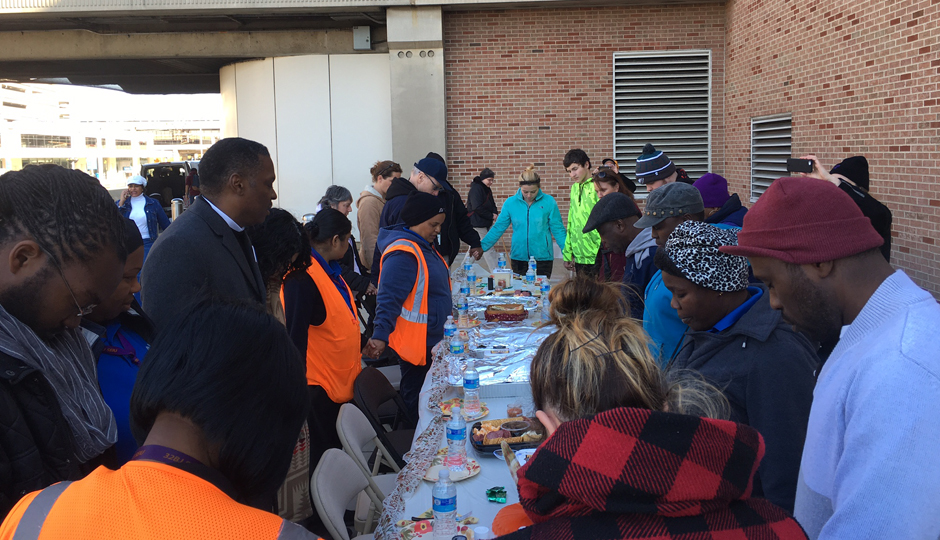Airport Workers Striking, Fasting and Hoping Holiday Travelers Notice

Workers at the Philadelphia International Airport pray for workers’ rights before a Thanksgiving feast. They held a 24-hour fast to protest what they say are low wages and unfair treatment from management. (Photo by Jared Shelly.)
First they went on strike for 24 hours. A few days later, they fasted for 24 hours. They held a “vigil” at City Hall, rallied alongside City Council members and the future mayor, and even held a makeshift Thanksgiving dinner — complete with a prayer session for workers rights.
They’re the workers at the Philadelphia International Airport who clean the cabins, push wheelchairs and handle baggage — and they’re stepping up organization efforts in a coordinated effort with workers at six other airports nationwide. They’re protesting what they perceive as low wages, poor treatment from management and pushback against non-union workers who attempt to organize. Some wheelchair pushers even say they’re not being paid the $12 mandatory minimum wage for subcontractors.
The timing of the organizing effort is certainly no surprise. The days leading up to Thanksgiving are some of the busiest of the year at the airport.
But is anybody noticing? During a 24-hour strike on Nov. 18-19, baggage handlers, wheelchair attendants, cabin cleaners and other workers walked off the job. But an airport spokesperson said she was not aware of any flights being delayed or cancelled because of the strike.
Still the workers who are employed by three airline service contractors — Prospect, PrimeFlight and McGinn Security rallied alongside City Council members and future mayor Jim Kenney — and made plenty of headlines.
Then on Nov. 24, they held a “vigil” at City Hall attended by Councilman Kenyatta Johnson and others. Then they fasted for a day and held a “break-the-fast” lunch on Nov. 25, the day before Thanksgiving. It’s unclear how many workers actually fasted but about 25 or so gathered outside the entrances to Terminals B and C to eat Turkey, mashed potatoes and stuffing. Rev. Gregory Holston from Philadelphians Organized to Witness Empower & Rebuild even led the group in prayer before and after the meal.
But did anyone notice? I was the only member of the media to attend and plenty of travelers hopped out of cars and into the airport without noticing. (The long picnic table was off to the side and out of most people’s view.)
But Julie Blust, regional communications manager of the 32BJ SEIU union, said that the union’s organizing efforts have helped lead to higher salaries recently.
“The striking and speaking out has had an impact because they’ve gotten substantial raises that they never would have had if they weren’t taking that kind of action,” she said.
She also said travelers are noticing: “I’ve heard countless workers tell me that people notice — particularly the ones that do more customer-service jobs,” she said. “Customers come up to them and say ‘we stand with you, we support you.’ ”
Debra Kleiss and Onetha McKnight both serve as wheelchair pushers — helping elderly or disabled travelers navigate the long corridors of the airport. They argue that they should be earning $12 per hour under the new wage laws for contract workers — but only make $8.40 plus tips. Apparently, they don’t earn the $12 because they get tips. But their salaries are up from $5.75 plus tips a few months ago.
“We did the one-day fast to protest conditions at the airport. Workers all across the country are facing the same issues that we’re facing here,” said McKnight, wearing a purple and yellow SEIU T-shirt, even though she’s not in the union. “We’re fighting for benefits. We want union rights. We’re tired of the intimidation here on the job. We want to form a union and the employees want to target people who are outspoken.”
Blust called it a fight for fairness: “These contractors are standing in the way of workers organizing and they use threats, intimidation and bullying and even firings for standing up for their rights,” she said. “There have been quite a few workers that have spoken out and have been punished when they speak out for better wages.”
Like what you’re reading? Stay in touch with BizPhilly — here’s how:


